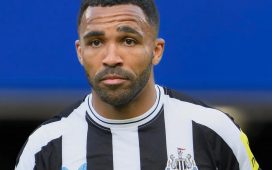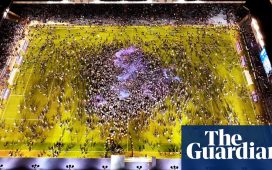Anita Elberse of Harvard Business School is discussing how it all started; how the world of football opened up to her teaching – which would see her become a mentor to some of the game’s A-list names, including Gerard Piqué, Kaká and Dani Alves.
Elberse, one of the youngest women to have been promoted to full professor with tenure in HBS’s history, had begun to cross over into sport from entertainment and media, making a case study for her students on the tennis player Maria Sharapova. This led to a research project into whether it paid to have an athlete endorsing a brand.
“There was a case on LeBron James and it started snowballing from there,” Elberse says, American accent obscuring her Dutch roots. “And then, all of a sudden, Alex Ferguson calls and, all of a sudden, I’m doing a project with him.”
It was the summer of 2012 and, according to Elberse, the then Manchester United manager and the people around him were “looking for what might be the next challenge for him after his active coaching career and maybe him talking about what he’s learned”. Elberse met Ferguson for breakfast in Boston. “I only realised later that it was a sort of audition,” she says. “He wanted to see if I could be the person to help him tell his story about the leadership that he’s brought to soccer.”
Ferguson would retire at the end of the 2012-13 season so Elberse might have been privy to a bombshell exclusive. “Looking back it was pretty naive not to have realised: ‘Oh, this might be his last year,’” she says, with a smile. “I didn’t know that was going to happen. I was able to follow him along for that last year. I visited the United training ground at Carrington, I went to his house and met his family, I saw him at the stadium. I even saw him in the famous room where he meets with the coach of the opposing team after matches.”
Elberse made a case study about Ferguson which asked what it took to run United, and they also wrote an article together for the Harvard Business Review, published in October 2013. It was entitled Ferguson’s Formula, and it distilled the eight leadership lessons that had formed the basis of his approach. Elberse commented at the time that “many of them can certainly be applied more broadly, to business and to life”.
By that time something else had changed in Elberse’s career. She had developed a course for HBS’s MBA students on entertainment, media and sport and, as the way she wrote and taught her case studies gathered repute, she was receiving more and more requests from people in various industries to sit in on her classes. She made a decision – to launch an executive education version of the course.
The first edition of the four-day Business of Entertainment, Media and Sport programme took place in June 2013 and Ferguson was one of the guest speakers – “a very special moment,” she says. Ferguson has since been to Harvard several times to watch Elberse teach his case study and to answer questions from students.
In previous generations a retired footballer might open a pub or a sports retail store but, as Elberse says, it is rather different now. Top players can be brands in their own right and, in some instances, they have started to push high-end business ventures before they retire. Elberse’s executive course aims to highlight via open-ended case studies the patterns that exist in the worlds of film, television, music and sport; to show how to market and manage creative products and talent; and how to build businesses around content.

It runs every year for 80 people – each of whom pays $10,000 (£7,700) – with the admissions committee looking to offer a well-balanced room, containing athletes, actors, musicians, agents and senior executives. They live a student life on the Harvard campus, which is a great leveller, a facilitator of equality and what Elberse calls “one big community”. There is a cross-pollination of ideas in an environment that attendees have described as “inspiring”. It is a perfect space for networking.
Piqué was the first footballer to attend and he has been followed by Kaká, Alves, Mario Melchiot, Nuri Sahin, Edwin van der Sar, Tim Cahill and Oliver Kahn. There have been plenty of American sports stars, including Dwyane Wade, Chris Paul, Pau Gasol and Chris Bosh (all from the NBA), plus Michael Strahan and Brandon Marshall (from the NFL), while from the entertainment sector there has been the actor Channing Tatum, the rapper LL Cool J and the singer Ciara.
“If you look at Gerard Piqué – he is an active player at Barcelona but he has an investment company called Kosmos and he has already established a significant business,” Elberse says. “He’s had a stake in the Players’ Tribune from the get-go; he had a video game company as part of Kosmos and he has bought the Davis Cup in tennis for $3bn. It’s pretty simple what the footballers want from the course. They come to learn about the world of entertainment more generally, to discover patterns that are there in those industries that they can benefit from.
“I think the outside world looks at these people and says: ‘You are a footballer, this is what you do and that is probably all that you’ll do.’ Well, no. What I’ve learned is that they can do a lot more than what we’ve seen them do on the field. There are some lessons that are very transferable – performing under high-pressure situations, working as part of a team, which all businesses are. They have worked under great leaders and probably bad ones, too.
“One of the things we do, and it’s almost implicitly, is to show them that they actually know a lot more about business than they think they might. You might not know the jargon or the ins and outs of financial management or what it means to have the operations side of a business but there are a bunch of things that you do know and might be very good at.”
Kaká and Alves, former Brazil teammates, did the course together and Elberse remembers how the latter, now playing for São Paulo, turned up in full Harvard garb. “He had the Harvard tie, the Harvard cardigan, the Harvard pants – he was completely Harvard, which was very, very funny,” Elberse says. “He was by far the goofiest of the players that I’ve had in the programme. He is completely crazy and he is proud of being as crazy as he is. But he was great to have for the group.
“He has an audience of millions through social media and he can do whatever he wants to do. The same goes for Kaká, who is a really smart business guy. I can imagine him being the president of a soccer club.”
Van der Sar was appointed the chief executive of Ajax in 2016, having hung up his footballing boots in 2011, which represented a relatively quick transition from player to businessman. “He was the Ajax CEO when he was in the class,” Elberse recalls. “It’s really interesting to hear what he’s learned from his playing career and how he’s trying to apply that now that he’s on the other side.”
Elberse’s case studies present a story and invite questions and discussion. “Dwayne ‘The Rock’ Johnson is a famous film star – why would he bother with a digital channel?” she says. “What is LeBron trying to build in Hollywood? What is Disney trying to do with the investments they are making in films?”
Elberse focuses the bulk of the course on her case studies but, on the final full day, a tradition has built whereby some of the more well-known members of the class sit on a panel and take questions. What has stood out is the searing honesty of the answers.
“Kaká talked about when he went from Milan to Real Madrid and felt like the biggest failure,” Elberse says. “He’d been the world player of the year, the fee had been a record and it didn’t work out – he talked about what that does to you as a person and how you recover. That was very powerful.
“Similarly, when Oliver Kahn was here, he talked about having won the Golden Ball and Golden Glove at the 2002 World Cup and then, for the 2006 World Cup, which was in Germany, his country, he was dropped. He talked about how he had to support Jens Lehmann, who became the No 1 goalkeeper, what he had to tell himself.
“Everyone was choking up. I was supposed to lead this and I was choking up. Those are the moments that have stuck with me.”














